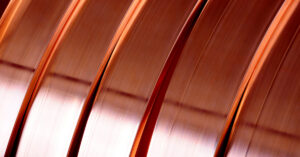
In January-October this year, Ukrainian companies increased imports of copper and copper products in value terms by 91.1% compared to the same period last year, to $104.029 million.
According to customs statistics released by the State Customs Service of Ukraine on Wednesday, exports of copper and copper products decreased by 20.6% to $61.107 million over the period.
In October, Ukraine imported copper worth $13.932 million and exported it for $6.090 million.
In addition, in 10 months of 2023, Ukraine reduced imports of nickel and products by 77.7% compared to the same period in 2022 to $12.438 million ($806 thousand in October), while imports of aluminum and aluminum products increased by 10.1% to $307.569 million ($32.582 million).
At the same time, it reduced imports of lead and lead products by 66.3% to $892 thousand ($19 thousand), imports of tin and tin products by 21.1% to $2.284 million ($232 thousand), but increased imports of zinc and zinc products by 23.1% to $37.525 million ($3.538 million).
Exports of aluminum and aluminum products in January-October this year decreased by 2.3% compared to the same period last year to $81.616 million (in October – $9.996 million), lead and lead products increased by 27.9% to $12.498 million ($1.308 million), nickel and nickel products amounted to $257 thousand ($1 thousand), while in 10 months of 2022 it was $1.086 million.
Zinc was exported abroad for $99 thousand over 10 months (in October – $10 thousand) against $1.321 million in January-October 2022. Exports of tin and tin products amounted to $57 thousand (no deliveries were made in October) against $421 thousand in 10 months of 2012.
As reported, in 2022, Ukrainian enterprises reduced imports of copper and copper products in value terms by 64.3% compared to the previous year – to $65.370 million, while their exports decreased by 56.3% to $90.245 million.
In addition, in 2022, Ukraine reduced imports of nickel and nickel products by 49.9% compared to 2021, to $59.754 million, and aluminum and aluminum products by 33.4%, to $340.398 million. At the same time, it reduced imports of lead and lead products by 66.6%, to $2.839 million.
Imports of tin and tin products fell by 33.5% to $3.312 million, and imports of zinc and zinc products decreased by 58.7% to $38.690 million.
In 2022, exports of aluminum and aluminum products decreased by 42.7% compared to 2021, to $96.972 million, lead and lead products – by 68.7%, to $11.970 million, and nickel and nickel products – by 73.9%, to $1.268 million.
Zinc exports in 2022 amounted to $1.331 million, while in 2021 they amounted to $550 thousand. Exports of tin and products in 2022 amounted to $424 thousand, compared to $346 thousand in the previous year.
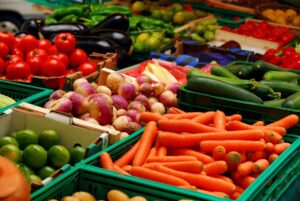
In October 2023, Ukraine managed to export 4.8 million tons of agricultural products, up 15% from the same period of the previous month, the Ukrainian Agribusiness Club reported on Facebook.
According to the report, the increase in exports in October 2023 was achieved despite problems with routes through the Danube river ports – traditional seasonal shallow water, which prevents the entry of larger vessels, and a decrease in the load on barges.
“Part of the increase in exports was due to the addition of another export channel – the seaports of Odesa region, which are currently operating as part of a temporary sea corridor. However, the volume of exports through this channel is very far from pre-war levels,” the analysts stated.
According to their information, in October 2023, Ukraine exported 2.5 mln tonnes of grains, 52% of which were wheat and 45% were corn, which showed a 20% increase compared to the previous month. Oilseeds were exported to 914.0 thsd tonnes (rapeseed – 48%, soybeans – 48% and sunflower seeds – 3%), up 4%.
In addition, exports of vegetable oils increased by 6% to 508.7 thousand tons (sunflower oil – 80%, rapeseed oil – 14%, and soybean oil – 6%), and by 18% of cake – 491.5 thousand tons (sunflower oil – 86%, soybean oil – 14%).
Exports of corn and soybeans, which are currently being actively harvested, increased compared to the previous month.
“Although there has been an increase in exports, they remain insufficient to export the harvest that Ukraine has harvested this year. For the relatively normal functioning of the agricultural market, Ukraine needs to export about 6 million tons of food per month, preferably by sea, where logistics are less expensive,” the UCAB summarized.
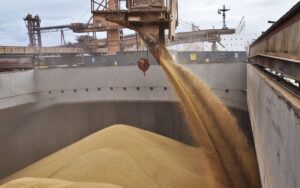
Romania is waiting for Ukraine to submit an action plan for effective measures to control grain exports “to prevent market distortion,” which Ukraine promised to submit by the end of Monday, September 18, according to a press release from the Bucharest government, local media reported on Friday evening.
The executive’s statement comes after the European Commission on Friday decided to lift restrictions on Ukrainian grain imports in five countries, including Romania, but asked Kyiv to develop a plan for effective measures to control transportation.
“Depending on the Action Plan presented by the Ukrainian side, the Romanian government will decide on appropriate measures to protect Romanian farmers,” the statement said.
“The government is in constant contact with the European Commission and the Ukrainian side to ensure that the new mechanism for restricting imports of Ukrainian products proposed by the EC prevents distortion of the markets of EU member states,” the statement said.
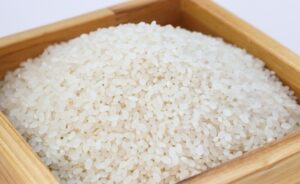
The U.S. Department of Agriculture in its September review lowered its estimate of India’s rice exports next year to 17.5 million tons from 19 million tons in the August forecast. This year, exports are expected to reach 20 million tons.
World rice prices have soared to 15-year highs amid export restrictions imposed by India, the world’s largest rice exporter, the USDA said. In July, the country imposed a ban on the export of most rice varieties, followed by an export duty on steamed rice and a minimum export price for basmati. Importers switched to other major suppliers, such as Thailand and Vietnam, and as a result, their export prices rose to the highest levels since 2008.
At the same time, even before India’s restrictions, rice prices were rising amid strong demand from importers and declining production in a number of countries.
In 2008, India, at that time the second largest exporter of rice, also imposed export restrictions, which led to a sharp rise in prices. After the restrictions were lifted in 2011, the country increased supplies to the global market and became the largest exporter the following year, and has maintained this position since then. In 2022, India exported slightly more than the next four suppliers combined, accounting for about 40% of global supplies. Since 2020, the country has been supplying white rice at the lowest prices, especially to sub-Saharan Africa. The sharp rise in prices is expected to have a significant impact on these import-dependent countries.
Despite the significant increase in export prices, they have not reached the record levels of 2008, as export restrictions are less severe this time. In addition, Vietnam, which stopped exports in 2008, is now resuming shipments.
According to the USDA forecast, global rice exports this year will amount to 53.11 million tons (56.12 million tons last year). Next year, supplies may decline to 52.1 million tons (the forecast was lowered from 53 million tons, according to the August estimate).
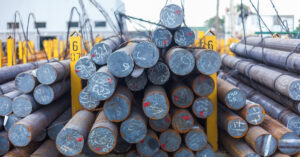
In January-August this year, Ukraine reduced exports of carbon steel semi-finished products in physical terms by 50.9% year-on-year to 780,413 thousand tons.
According to the statistics released by the State Customs Service (SCS), exports of semi-finished carbon steel products amounted to $410.674 million in monetary terms over the period (down 59.3%).
The main exports were made to Bulgaria (35.79% of supplies in monetary terms), Poland (27.85%) and Romania (7.51%).
In January-August, Ukraine imported 92 tons of semi-finished products from China worth $169 thousand.
As reported, in 2022, Ukraine decreased exports of carbon steel semi-finished products in physical terms by 72% compared to the previous year – to 1 million 899.729 thousand tons, and in monetary terms by 70.9% – to $1 billion 191.279 million. The main exports were made to Bulgaria (26.55% of supplies in monetary terms), Poland (13.97%) and Italy (12.13%).
In addition, Ukraine imported 5,558 thousand tons of similar products in 2022, which is 85.7% less than in 2021. In monetary terms, imports decreased by 86% to $3.634 million. Imports were carried out from the Russian Federation (96.92% of supplies before the war), China (1.84%), and Romania (1.21%).
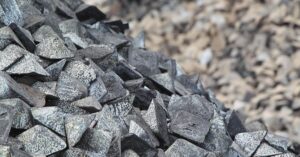
In January-August this year, Ukraine increased exports of ferroalloys in physical terms by 20.2% compared to the same period last year, up to 312.445 thousand tons.
According to statistics released by the State Customs Service, exports of ferroalloys decreased by 41.3% to $271.280 million in monetary terms.
The main exports were to Poland (55.89% of supplies in monetary terms), Turkey (12.16%) and the Netherlands (8.09%).
In addition, in the period under review, Ukraine imported 5.059 thousand tons of these products, which is 69.6% less than in January-August 2022. In monetary terms, imports decreased by 66.3% to $20.971 million.
Imports were carried out mainly from India (19.14%), China (17.26%) and Armenia (16.98%).
As reported, in 2022, Ukraine reduced exports of ferroalloys in physical terms by 47.7% compared to the previous year – to 349,560 thousand tons, in monetary terms by 46% – to $564.136 million. At the same time, the main supplies were made to Poland (53.25% of exports in monetary terms), the Netherlands (13.13%) and Romania (5.66%).
In addition, last year Ukraine imported 20.546 thousand tons of these products, which is 65.5% less than in 2021. In monetary terms, imports decreased by 59.1% to $72.705 million. Imports were carried out mainly from Norway (22.67%), China (15.60%) and Kazakhstan (14.10%).
The business of the Stakhanov and Zaporizhzhia Ferroalloy Plants (SZF and ZZF) was organized by PrivatBank (Kyiv) before the nationalization of the financial institution. Nikopol Ferroalloy Plant is controlled by EastOne Group, established in the fall of 2007 as a result of the restructuring of Interpipe Group, and Privat Group.